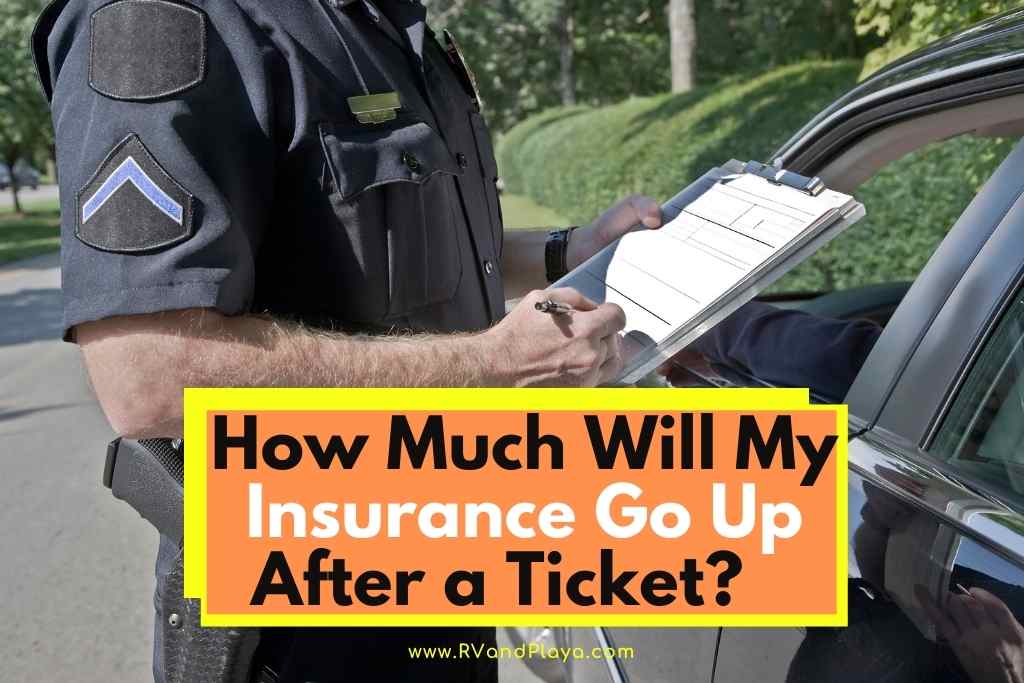Do you know how much my insurance will go up after a ticket? this is one of the questions our readers ask a lot. Well, we´ve got you covered.
Unsurprisingly, more than half the drivers in America speed, as per the latest survey performed by the United States Department of Transportation.
Despite the various methods in place to prevent speeding, it still happens on a daily basis. And yes, it can dramatically impact your car insurance.
So, how much will my insurance go up after a ticket? On average your car insurance rate will increase by 20% to 30% after a speeding ticket. The increase is equating to almost $275 up to $425. However, the state’s percentage also increases the higher over the speed limit you traveled. In Michigan, your insurance will increase by 70% if you are driving 30+ mph over the limit.
Table of Contents
How Much Does Car Insurance Go Up For a Speeding Ticket?
According to Forbes Advisors, the national average increase for car insurance rates after a speeding ticket is 21%, equating to almost $350. However, it may go up by 30%, depending on a few factors:
- The location where you violated the speeding limit
- Whether your ticket was your first offense
- Your driving record before the speeding ticket, including at-fault car accidents and other types of traffic violations
- How fast you were traveling over the speeding limit
- The amount of time between this speeding ticket and any previous moving violations
Read also: When Does Car Insurance Go Down for Males? (10 Secrets To Know)
A State by State Analysis
Car insurance is regulated at the state level. Therefore, the percentage that your rate increases after a speeding ticket depend mainly on the state you live in/where the violation occurred.
Generally speaking, the state’s percentage also increases the higher over the speed limit you traveled. It tends to grow in the following increments:
- 11 to 16 mph over the limit
- 16 to 29 mph over the limit
- 30+ mph over the limit
The states where the percentage doesn’t increase are:
- Alaska (19%)
- California (34%)
- Colorado (19%)
- Hawaii (10%)
- Idaho (30%)
- Illinois (20%)
- Kansas (16%
- Louisiana (21%)
- Massachusetts (20%)
- Maryland (18%)
- North Carolina (50%)
- North Dakota (21%)
- Nebraska (28%)
- New Mexico (19%)
- Oklahoma (30%)
- Pennsylvania (9%)
- South Dakota (18%)
- Texas (15%)
- Utah (18%)
- Washington (19%)
- Wyoming (28%)
If you live in the above states, you don’t have to consider how far you were driving over the speed limit to figure out your insurance increase.
However, insurers in the states below steadily increase their insurance depending on how far above the limit you were:
| States | Increase (11 to 16 mph over the limit) | Increase (16 to 29 mph over the limit) | Increase (30+ mph over the limit) |
|---|---|---|---|
| Alabama | 28 | 28 | 28 |
| Arkansas | 20 | 20 | 43 |
| Arizona | 25 | 27 | 27 |
| Connecticut | 17 | 17 | 30 |
| DC | 15 | 15 | 31 |
| Delaware | 18 | 21 | 50 |
| Florida | 27 | 31 | 46 |
| Georgia | 17 | 27 | 59 |
| Iowa | 17 | 19 | 19 |
| Indiana | 24 | 24 | 26 |
| Kentucky | 15 | 30 | 53 |
| Maine | 15 | 19 | 19 |
| Michigan | 29 | 43 | 70 |
| Minnesota | 22 | 27 | 27 |
| Missouri | 10 | 11 | 11 |
| Mississippi | 29 | 29 | 44 |
| Montana | 8 | 12 | 12 |
| New Hampshire | 23 | 23 | 46 |
| New Jersey | 17 | 26 | 32 |
| Nevada | 20 | 21 | 29 |
| New York | 12 | 18 | 18 |
| Ohio | 21 | 27 | 38 |
| Oregon | 20 | 20 | 29 |
| Rhode Island | 21 | 21 | 28 |
| South Carolina | 16 | 16 | 30 |
| Tennessee | 15 | 15 | 34 |
| Virginia | 20 | 20 | 31 |
| Vermont | 14 | 14 | 29 |
| Wisconsin | 16 | 25 | 25 |
| West Virginia | 15 | 19 | 47 |
As you can see, some of these states raise their insurance rates by over 50%!
With all that said, the insurers themselves treat traffic tickets differently.
They have their own calculations and metrics for deciding how much they should charge you.
For instance, Progressive tends to raise their insurance by 31% following a ticket for speeding 16 to 29 mph above the limit, whereas Allstate raises theirs by 20%.
Read also: Is Progressive RV Insurance Good? What You Must Know
When Do Car Insurance Rates Increase After a Speeding Ticket?
Thankfully, the increase won’t usually take place until it’s time for your policy renewal, as that’s when your insurer re-evaluates your record.
Because the change takes a long time (depending on when you received the ticket), it’s typically worth staying with your current insurance provider until a couple of months before it expires.
How Long Does a Speeding Ticket Affect Your Car Insurance Rate?
Moving violations, including speeding tickets, are generally considered to be a “surchargeable” incident.
Depending on your state, they can stay on your driving record for three to five years on average. If you’re lucky, your and state and insurer will reduce the surcharge amount after every year without another violation.
- Arkansas (3 years)
- Alabama (after 2 years points are removed, but the incident remains on your record for life)
- Arizona (1 year)
- Alaska (1 year)
- Colorado (incident remains on your record for life; however, you can reduce the points on your license)
- Connecticut (3 years)
- California (3 years and 3 months)
- Delaware (2 years)
- Florida (5 years)
- Georgia (2 years)
- Hawaii (10 years)
- Indiana (2 years)
- Illinois (maximum 5 years)
- Idaho (3 years)
- Iowa (5 years)
- Kentucky (points removed from your license after 2 years, but the incident remains on your record for 5 years)
- Kansas (3 years)
- Louisiana (3 years)
- Maryland (3 years)
- Maine (1 year)
- Massachusetts (6 years)
- Michigan (7 years)
- Minnesota (5 to 10 years)
- Missouri (3 years)
- Montana (points removed from your license after 3 years, but the incident remains on your record for life)
- Mississippi (1 year)
- Nebraska (5 years)
- New Jersey (5 years)
- New Hampshire (3 years)
- New Mexico (1 year)
- New York (1.5 years)
- North Carolina (3 years)
- North Dakota (3 years)
- Oregon (2 years)
- Oklahoma (maximum 3 years)
- Ohio (incident remains on your record for life)
- Pennsylvania (1 year)
- Rhode Island (3 years)
- South Carolina (2 years)
- Texas (3 years)
- Tennessee (2 years)
- Utah (3 years)
- Virginia (5 years)
- Vermont (2 years)
- West Virginia (points removed after 2 years, but the incident remains on your record for 5 years)
- Washington DC (2 years)
- Wyoming (1 year)
- Washington (5 years)
- Wisconsin (5 years)
How to Lower Your Car Insurance Following a Speeding Ticket
Believe it or not, there are ways to decrease your car insurance after you’ve been cited for speeding. These include:
- Shopping around for the best deal using comparison sites.
- Driving safely to ensure you don’t get any more speeding tickets or other violations.
- Take a defensive driving course to get up to 10% off your insurance.
- Reduce the level of coverage you have. But proceed with caution on this one.
The Bottom Line
The best course of action is not to speed. But, if the deed is done, you now know more about what to expect from your car insurance.
Here are some of my favorite services, products, and Stores
I created this resource page to easily list recommended services, products, and companies that I use and/or those I know are valuable.
This way you can quickly find great products and services all in one place. You can save thousands of dollars all from one page!
There are affiliate links, so if you do decide to use any of them, I´ll earn a small commission. But in all honesty, these are the exact what I use and recommend to everyone, even my own family.
+ Products & Services
+ Earn More
+ Save Thousands of Dollars
+ Live More
References
https://www.metromile.com/blog/how-long-does-a-speeding-ticket-stay-on-your-record/
https://www.forbes.com/advisor/car-insurance/speeding-ticket-rate-increase/
Recent Posts
When Does Car Insurance Go Down for Males? (10 Secrets To Know)
Do you know when car insurance for males goes down? this is one of the questions our readers ask a lot. Well, we´ve got you covered. Women typically pay less for car insurance than men. And no,...
Is Car Insurance a Waste of Money? (The Truth – Nobody Is Talking About!)
Do you know if car insurance is a waste of money? this is one of the questions our readers ask a lot. Well, we´ve got you covered. Car insurance can be pricey. Because of that, you're not alone...


